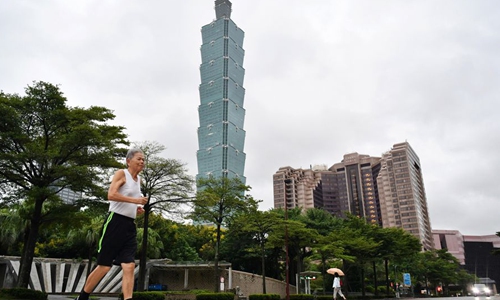DPP collusion with hostile US ‘NGOs’ open as ever
By Lin Xiaoyi Source: Global Times Published: 2020/11/9 1:08:53

A citizen runs in front of the Taipei 101 skyscraper in Taipei, southeast China's Taiwan, on Oct. 1, 2019. (Xinhua/Chen Bin)
US-funded NGOs are increasingly meddling in the Taiwan question to further erode the space for mutual trust between the mainland and Taiwan, and create more obstacles to peaceful development of cross-Straits relations, experts said.
Last week, the National Democratic Institute (NDI) and International Republican Institute (IRI), both US organizations, announced they will open representative offices on the island of Taiwan. In a "settled down statement," Daniel Twining, the IRI President said this move was in response to Chinese mainland's becoming "more aggressive in violating the global rules-based order."
Such a high-profile declaration from US NGOs mark a further infiltration of US political forces in the island of Taiwan, indicating that the joint efforts made by Washington and the Taiwan authority to contain the mainland will become more visible and frequent, Wang Jianmin, a Taiwan affairs expert at the Chinese Academy of Social Sciences, told the Global Times on Monday.
While NDI and IRI claim to be nonprofit, nonpartisan organizations, they accept money from the National Endowment for Democracy (NED), which is an NGO that has received financial support and oversight from US Congress, reported Taiwan island-based China Times.
Washington has been frequently playing the Taiwan card to put pressure on China, while Taiwan's ruling Democratic Progressive Party leans on Washington to adopt a "Taiwan independence" policy, Wang said.
Both NDI and IRI describe a good vision, saying they will collaborate with local administrations, civil society and academia to further promote transparent and accountable governance for citizens in the island of Taiwan.
However, based on previous experience, observers expressed these NGOs will do nothing but disrupt cross-Straits exchanges, through funding local so-called "think tanks" to create more rumors targeting the Chinese mainland while training young people to fight for the "independence" of Taiwan.
The NDI and IRI are notorious for churning out anti-China propaganda and meddling in other countries' internal affairs.
In 2003, the IRI was strongly criticized for interfering in Cambodia's political process. Analysts questioned the credibility of IRI's activities as an election observer, saying it showed a distinct bias toward the Sam Rainsy Party that was aimed at undermining the electoral prospects of the Cambodian People's Party.
The NDI and IRI groundlessly fabricated stories on Xinjiang, Tibet, Taiwan and Hong Kong, "Their promotion of US values and ideologies is always linked to attacks on China's human rights issues," Wang remarked.
According to a Hong Kong-based newspaper Ta Kung Pao, NED had also held many "youth leadership conference with the Taiwan Democracy Foundation and invited the separatist leaders of "Tibetan independence," "Xinjiang independence," and "Hong Kong independence" to give speeches to provoke subversive activities.
The NDI, IRI and NED have been subject to sanctions by China since December 2019 for having "great responsibility for the chaos in Hong Kong."
"Officials of the DPP authority always seem to welcome any decision from US uncritically, but they don't think about the consequences that these moves might have," Jennifer Sung, a PhD student at political science department of the National Taiwan University in Taipei told the Global Times. "I don't want to see the island filled with rumors and Taiwan youth brainwashed by hatred."
Wang noted that US sending senior officials to visit Taiwan island and increasing arms sales have made cross-Straits relations more fragile. "What is needed now is mutual trust, not more suspicion. Further collusion between the US and Taiwan authority to try to break the bottom line of one-China principle will only increase tensions and keep the people on both sides of the Straits away from peace," Wang warned.
Posted in: HK/MACAO/TAIWAN